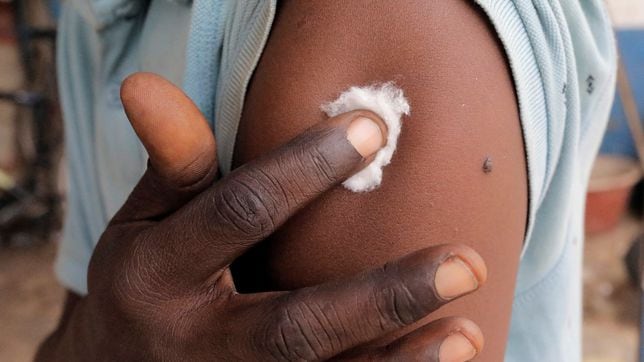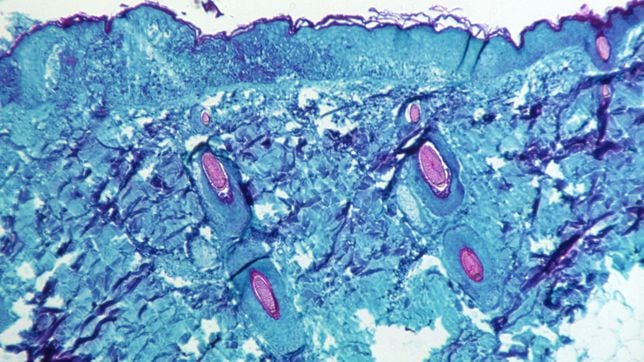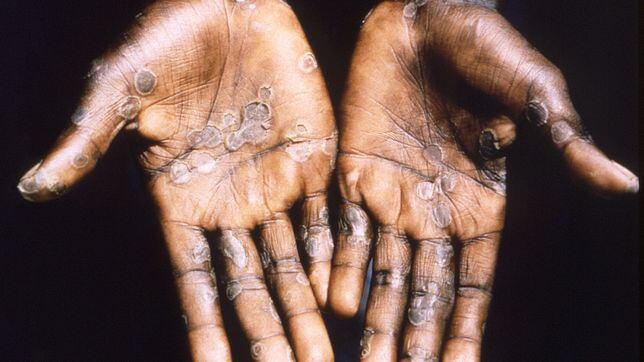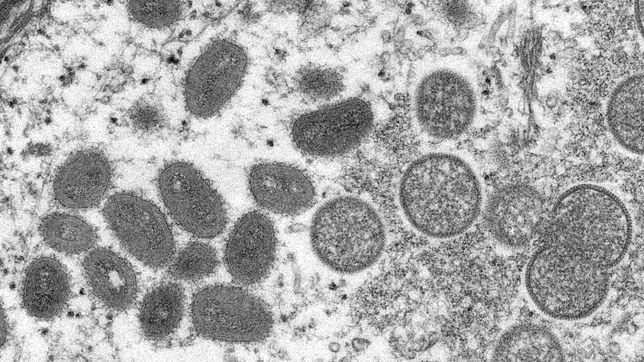Monkeypox latest news summary | 23 May 2022
Live updates and latest news on the new cases and infections caused by the monkeypox outbreak in the US and Europe.
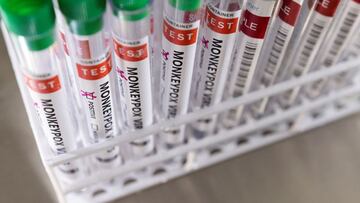

Show key events only
Monkeypox outbreak: live updates
Monkeypox outbreak: headlines
- One confirmed case and four suspected cases in US, CDC says on Monday
- President Biden offers more optimistic outlook on monkeypox outbreak: "I just don't think it rises to the level of the kind of concern that existed with covid-19"
- UK Health Security Agency confirms 36 more cases in England
- As of Saturday 21 May, the WHO says 12 non-endemic countries have reported 92 cases, with an additional 28 suspected cases under examination
- US government orders $119 million of smallpox vaccine Jynneos - does it protect against monkeypox?
- WHO doesn't see need for mass vaccination, isolation and contact tracing should suffice
Helpful information & links:
- Monkeypox symptoms: fever, malaise, headache, and sometimes sore throat and cough, and lymphadenopathy.
- Everything you need to know about Monkeypox.
- Mokeypox: How does it spread? Does it require sexual contact?
Related AS USA articles:
Monkeypox outbreak is a "containable situation"
The World Health Organization held a briefing on what is known about monkeypox and the recent outbreak which has spread to at least 12 countries outside the area where it is endemic. Here's what they had to say.
WHO says no evidence of monkeypox virus mutation
At a briefing on Monday, a senior executive at the World Health Organization said there is no evidence that the monkeypox virus has mutated. Rosamund Lewis, head of the smallpox secretariat that is part of the WHO Emergencies Program, told press that the infectious disease that has been endemic in west and central Africa mutations generally doesn't change.
However, the UN agency is performing genome sequencing of cases which will help inform understanding of the current outbreak. Health experts are being vigilant for worrisome mutations that could make a virus more easily transmissible or severe.
Transmission of monkeypox can happen close person-to-person contact,as well as contact with items used by a person who is infected, such as clothes, bedding or utensils. But monkeypox does not usually spread easily between people.
After a case of monkeypox was identified in Massachusetts, US health officials have ordered millions of doses of a vaccine to control the virus’ spread.
One confirmed case, four suspected in US - CDC
The US Centers for Disease Control and Prevention (CDC) says there is currently one confirmed monkeypox case in the country, while there are a further four suspected cases.
The four suspected cases involve men in New York, Florida and Utah.
The confirmed case is a man in Massachusetts who had recently travelled to Canada. The state's department of health revealed the case on Wednesday, saying it "poses no risk to the general public".
"It is likely that there are going to be additional cases reported in the United States," the CDC’s Dr Jennifer McQuiston said on Monday.
Don't expect monkeypox to lead to lockdowns, expert says
Monkeypox is “unlikely” to lead to nationwide lockdowns like those witnessed at the height of the covid-19 pandemic, a UK doctor has told Sky News.
“I think with monkeypox it’s very unlikely that we’re going to get to a situation where we would have a lockdown,” Dr Mark Lawton said on Monday. “This is a virus that’s spread through close contact, mostly skin to skin. It can be through infected clothes or bed linens. Potentially droplets from close contact. So I think it’s unlikely that it’s going to spread in the same way.
“[Monkeypox is] ultimately still very rare, most people will have a very mild illness. Part of the reason for lockdown with covid was the fact that it was going to overwhelm the health service. We don’t expect to see that kind of problem with monkeypox.”
Dr Lawton, who is a spokesperson for the British Association for Sexual Health and HIV, added that monkeypox should not be labelled as a sexually transmitted disease.
“It’s transmitted through close contact of any sort. Now, obviously, sexual contact might mean that contact was closer, it might mean that contact is for longer periods of time, and sex is very popular. So we do see it spread in that mechanism.
“But it’s certainly not a sexually transmitted infection, and I think one of the problems that we still have sadly in this country is a lot of stigma surrounding sexually transmitted infections.
“So it’s important that we don’t introduce stigma, because that then becomes a barrier for people coming forward and getting tested, which is what we need to do to try and minimise the spread of this.”
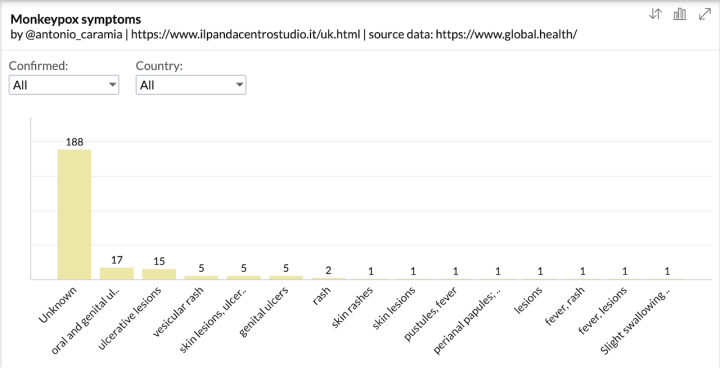
Monkeybox dashboard tracks case numbers
Italian management engineer Antonio Caramia has created a dashboard with which to track the number of suspected and confirmed cases worldwide.
The tool also tracks data such as hospitalizations and reported symptoms.
Take a look at Antonio Caramia’s monkeypox dashboard
(Image: www.ilpandacentrostudio.it)
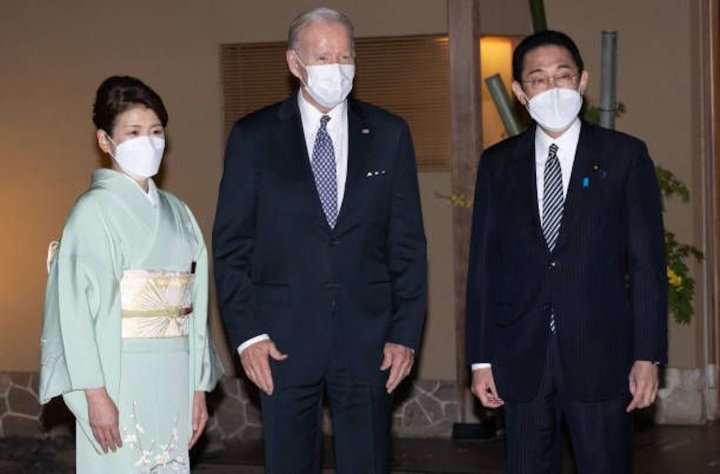
Biden: Monkeypox not at same level of concern as covid-19
President Biden on Monday offered a more reassuring message on the monkeypox outbreak, having on Sunday said it is something “everybody should be concerned about”.
"We have had this monkeypox in large numbers in the past,” Biden told reporters in Tokyo. “We have vaccines to take care of it.
“I just don't think it rises to the level of the kind of concern that existed with covid-19."
(Photo: Saul Loeb/Getty Images)
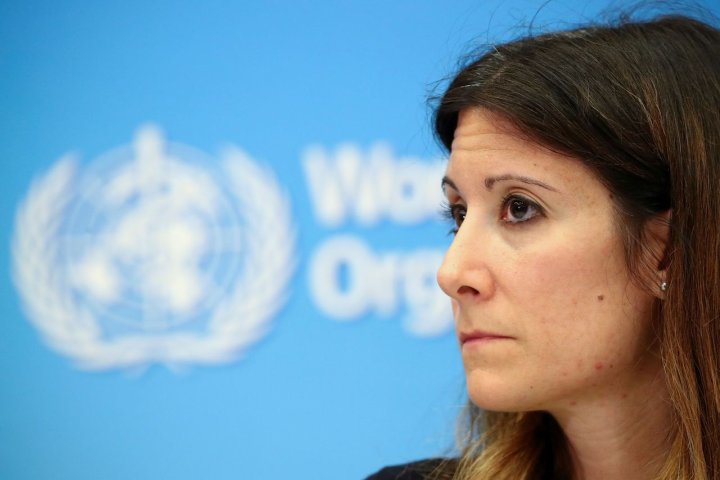
WHO’s Van Kerkhove offers reassuring message on monkeypox
We saw in an earlier post that the World Health Organization’s Maria van Kerkhove described the global monkeypox outbreak as “a containable situation” during a live Q&A today. Here’s the full quote from Van Kerkhove, who is the WHO’s lead for covid-19 and emerging diseases and zoonoses.
“We do need to put this into context because it’s not covid,” Van Kerkhove said. “We’re talking about less than 200 cases of confirmed and suspected cases so far. That may change over time, so this is why it’s really important that we have surveillance and why we have raised the alert to be on the lookout for this in countries that don’t typically experience monkeypox.
“We’ve been working with countries, we’ve been working with ministries of health to expand surveillance, to look for people who have a rash […], so that we really understand the extent of infection.
“But your question was who is at risk? Transmission is really happening from close physical contact. Skin-to-skin contact. So it’s quite different than covid in that sense. So we are looking for people who have a rash, so we can help them first and foremost to understand what their risk is. And we should say that most of the people who have been identified so far have had more mild disease or, let’s say, not severe disease, but anyone they come in contact with needs to be informed, so taht we can prevent onward spread.
“And the thing I just want to say here is that this is a containable situation. Particularly in the countries where we are seeing these outbreaks that are happening, across Europe, in North America as well.”
(Photo: Denis Balibouse/Reuters)
Thirty-six more cases in England, but "risk to UK population remains low", says UKHSA
Here’s more on the news that the UK Health Security Agency (UKHSA) has said 36 more cases of monekypox have been detected in England.
The latest update from the UKHSA brings the total confirmed cases in England since 7 May to 56.
“While the current outbreak is significant and concerning, the risk to the UK population remains low,” the body said.
The UKHSA’s chief medical adviser, Dr Susan Hopkins, said: “Alongside reports of further cases being identified in other countries globally, we continue to identify additional cases in the UK. Thank you to everyone who has come forward for testing already and supported our contact tracing efforts - you are helping us limit the spread of this infection in the UK.
“Because the virus spreads through close contact, we are urging everyone to be aware of any unusual rashes or lesions and to contact a sexual health service if they have any symptoms."
Germany to lay out isolation procedures for monkeypox
Germany's health minister on Monday expressed concern about monkeypox outbreaks and said the country was due to release quarantine guidelines on Tuesday after reporting three cases.
Nearly 20 countries where monkeypox is not endemic have reported outbreaks of the viral disease, with more than 100 confirmed or suspected infections, mostly in Europe.
"In the next few hours we will work out recommendations together with the Robert Koch Institute regarding isolation recommendations and quarantine recommendations," German health minister Karl Lauterbach told journalists on the sidelines of the World Health Organization's annual assembly in Geneva. "We'll be able to present them tomorrow," he said.
Many - but not all - of the people who have been diagnosed in the current monkeypox outbreak are men who have sex with men. Lauterbach said that men who have sex with unknown partners were currently a risk group and should be warned about monkeypox "without any stigmatisation".
He said the pattern of the outbreak was worrying, saying it appeared that the way the virus spreads had changed, and urged quick action to contain a global outbreak.
Nearly 20 countries where monkeypox is not endemic have reported outbreaks of the viral disease, with more than 100 confirmed or suspected infections mostly in Europe, Reuters reports.
The UK Health Security Agency said on Monday that it had detected 36 additional cases of monkeypox in England, taking the total number of confirmed cases since May 7 to 56.
WHO: no evidence monkeybox has mutated
The World Health Organization does not have evidence that the monkeypox virus has mutated, a senior executive at the UN agency said on Monday, noting the infectious disease that is endemic in west and central Africa has tended not to change.
Rosamund Lewis, head of the smallpox secretariat which is part of the WHO Emergencies Programme, told a briefing that mutations are typically lower with this virus, although genome sequencing of cases will help inform understanding of the current outbreak.
The more than 100 suspected and confirmed cases in the recent outbreak in Europe and North America have not been severe, the WHO's emerging diseases and zoonoses lead and technical lead on COVID-19, Maria van Kerkhove, said. "This is a containable situation."
The outbreaks are atypical, according to the WHO, as they are occurring in countries where the virus does not regularly circulate. Scientists are seeking to understand the origin of the cases and whether anything about the virus has changed.
Denmark registers first case of monkeypox
Denmark has registered its first incidence of infection with monkeypox in an adult male who had returned from a trip to Spain, the health ministry said in a statement on Monday.
"Health authorities do not expect widespread infection in Denmark, but we are following the situation closely to be prepared for a possible development in the infection situation," Health Minister Magnus Heunicke said in a statement.
The man is currently in isolation and authorities are in touch with any close contacts, the ministry said.
Portugal reports 14 new confirmed monkeypox cases, total at 37
Portugal's health authorities reported on Monday 14 new confirmed cases of monkeypox on Monday, bringing the total tally of confirmed cases to 37.
In neighbouring Spain, health authorities in the region of Madrid confirmed four more cases on Monday, raising the total to 34. There are another 38 suspected cases of monkeypox in Madrid. Monkeypox, which mostly occurs in west and central Africa, is a viral infection that was first recorded in the Democratic Republic of Congo in the 1970s. Symptoms include fever, headaches and skin rashes starting on the face and spreading to the rest of the body.
The recent outbreak in more than 10 countries where it is not endemic is highly unusual, according to scientists. More than 100 confirmed or suspected cases have been reported, most of them in Europe.
Scotland confirms first case of monkeypox
Scotland confirmed its first case of monkeypox on Monday, Public Health Scotland said in a statement, adding that the person was receiving treatment while their contacts were being traced.
“We are working with NHS Boards (National Health Service) and wider partners in Scotland and the UK to investigate the source of this infection. Close contacts of the case are being identified and provided with health information and advice," said Nick Phin, Public Health Scotland's Director of Public Health Science.
WHO expects more cases of monkeypox to emerge globally
The World Health Organization said it expects to identify more cases of monkeypox as it expands surveillance in countries where the disease is not typically found. As of Saturday, 92 confirmed cases and 28 suspected cases of monkeypox have been reported from 12 member states that are not endemic for the virus, the U.N. agency said, adding it will provide further guidance and recommendations in coming days for countries on how to mitigate the spread of monkeypox.
What's behind the spike in monkeypox cases?
"Viruses are nothing new and expected," said Angela Rasmussen, a virologist at the Vaccine and Infectious Disease Organization at the University of Saskatchewan in Canada.
Rasmussen said a number of factors including increased global travel as well as climate change have accelerated the emergence and spread of viruses. The world is also more on alert to new outbreaks of any kind in the wake of the COVID pandemic, she said.
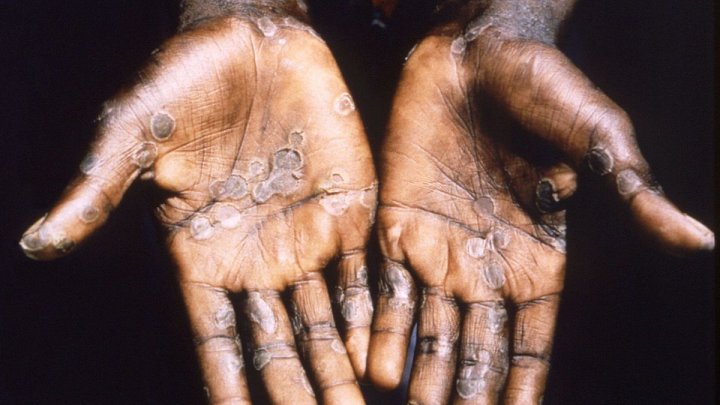
How can people protect against the infection?
The UK has begun to inoculate healthcare workers who may be at risk while caring for patients with the smallpox vaccine, which can also protect against monkeypox. The U.S. government says it has enough smallpox vaccine stored in its Strategic National Stockpile (SNS) to vaccinate the entire U.S. population.
There are antiviral drugs for smallpox that could also be used to treat monkeypox under certain circumstances, a spokesperson for the U.S. Department of Health and Human Services said in a statement.
More broadly, health officials say that people should avoid close personal contact with someone who has a rash illness or who is otherwise unwell. People who suspect they have monkeypox should isolate and seek medical care.
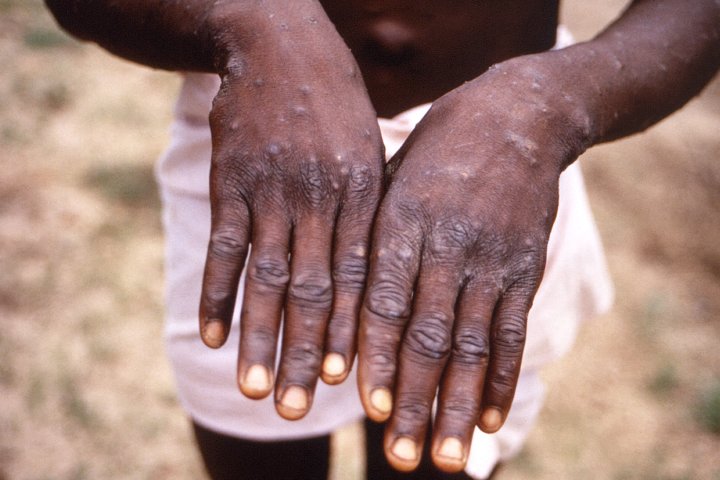
Are experts concerned about monkeypox outbreak?
The recent outbreaks reported so far are atypical, according to the WHO, as they are occurring in countries where the virus does not regularly circulate. Scientists are seeking to understand the origin of the current cases and whether anything about the virus has changed.
Most of the cases reported so far have been detected in the UK, Spain and Portugal. There have also been cases in Canada and Australia, and a single case of monkeypox was confirmed in Boston, with public health officials saying more cases are likely to turn up in the United States.
WHO officials have expressed concern that more infections could arise as people gather for festivals, parties and holidays during the coming summer months in Europe and elsewhere.
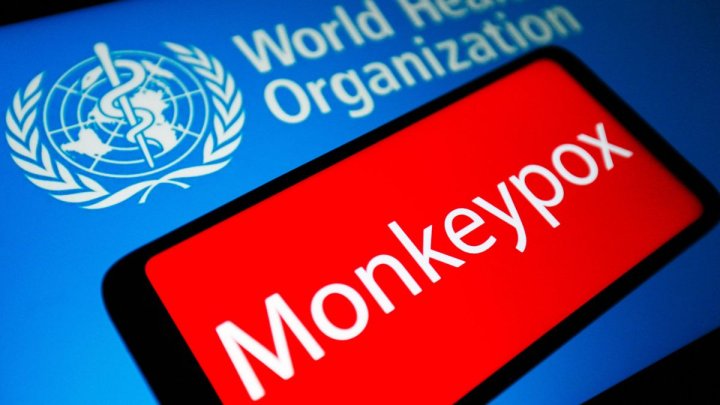
How dangerous is monkeypox?
The risk to the general public is low at this time, a U.S. public health official told reporters at a briefing on Friday.
Monkeypox is a virus that can cause symptoms including fever, aches and presents with a distinctive bumpy rash.
It is related to smallpox, but is usually milder, particularly the West African strain of the virus that was identified in a U.S. case, which has a fatality rate of around 1%. Most people fully recover in two to four weeks, the official said.
The virus is not as easily transmitted as the SARS-CoV-2 virus that spurred the global COVID-19 pandemic. Experts believe the current monkeypox outbreak is being spread through close, intimate skin on skin contact with someone who has an active rash. That should make its spread easier to contain once infections are identified, experts said.
"COVID is spread by respiratory route and is highly infectious. This doesn't appear to be the case with the monkeypox," said Dr. Martin Hirsch of Massachusetts General Hospital.
Argentina reports first suspected case of monkeypox
Argentina's health ministry said on Sunday it had detected a suspected case of monkeypox in Buenos Aires, amid growing global alarm over rising cases in Europe and elsewhere of the viral infection more common to west and central Africa.
A World Health Organization (WHO) roundup of the outbreak on Saturday had said there were 92 confirmed cases and 28 suspected cases of monkeypox, mostly in Europe but also in Canada, the United States and Australia.
There are no confirmed cases yet in Latin America.
A ministry said the suspected case was a resident of Buenos Aires province with symptoms compatible with monkeypox who had recently traveled to Spain. The patient was in good condition and isolated while tests were carried out, the ministry added.
"Presumptive" case of monkeypox being investigated in Florida
Florida health officials are investigating a possible case of monkeypox in an individual who traveled internationally. If confirmed it would be the first in the state and third in the US. The first case of monkeypox was identified in a person in Massachusetts who recently traveled to Canada. A second was identified in New York that is still awaiting CDC confirmation.
There are now over 190 cases confirmed or suspected in 16 countries outside the area where it is endemic.
Monkeypox outbreak, live updates: welcome
Hello and welcome to our live blog for Monday 23 May on the outbreak of monkeypox, with an increasing amount of confirmed or suspected cases being reported across the many parts of Europe including United Kingdom, Spain and Portugal. One case has also been confirmed in the United States.
